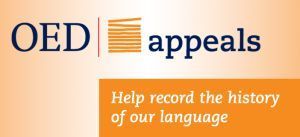The OED needs you! Announcing the new OED Appeals

Today the Oxford English Dictionary announces the launch of OED Appeals, a dedicated community space on the OED website where OED editors solicit help in unearthing new information about the history and usage of English. The website will enable the public to post evidence in direct response to editors, fostering a collective effort to record the English language and find the true roots of our vocabulary.
Click here to view the embedded video.
When researching and revising entries, OED editors use our famous citation files, gathered over more than a century, as well as electronic databases and corpora. Nonetheless, we sometimes find ourselves stumped when tracking down the very early uses of a word. Sometimes the trail runs cold earlier than we expect; in other cases, the ultimate origin of a word is shrouded in mystery. OED Appeals continues our long tradition of asking the English-speaking public for help in recording the origins of our vast, ever-changing lexicon. After all, when it comes to the words we read, write, speak, and hear each day, every one of us is an expert.
Click here to view the embedded video.
The OED has been a collaboration between lexicographers and the public since its earliest days, from the appeal issued by the Philological Society in 1859, to the television programme “Balderdash & Piffle,” broadcast in 2005 and 2007. OED Appeals continues this tradition by using the reach of the web and social media to connect lexicographers with those who may hold hidden clues to word history without even realizing it.
The first example of baked Alaska might be hiding in a forgotten cookbook on your bookshelf; your high school year book might hold the first evidence of the phrase in your dreams. Our goal is to leave no stone unturned in our search for the earliest evidence of each word included in the dictionary. Can you help us?
Click here to view the embedded video.
Each week, as OED editors go about their daily work of revising and researching entries, they will be posting new appeals for evidence on specific words. You can keep abreast of the latest requests by visiting the Appeals home page, or following @OEDonline on Twitter.
Here are some of the words we are researching right now:
Disco (earlier than September 1964)
Bellini (earlier than 1965)
Click here to view the embedded video.
FAQ (earlier than 1989)
Cootie (earlier than 1967)
Click here to view the embedded video.
Can you help us find documentation of these words’ earliest history? Happy hunting!
This post originally appeared on the OxfordWords blog.
The Oxford English Dictionary (OED) is widely regarded as the accepted authority on the English language. It is an unsurpassed guide to the meaning, history, and pronunciation of 600,000 words— past and present—from across the English-speaking world. As a historical dictionary, the OED is very different from those of current English, in which the focus is on present-day meanings. You’ll still find these in the OED, but you’ll also find the history of individual words, and of the language—traced through 3 million quotations, from classic literature and specialist periodicals to films scripts and cookery books. The OED started life more than 150 years ago. Today, the dictionary is in the process of its first major revision. Updates revise and extend the OED at regular intervals, each time subtly adjusting our image of the English language.
Subscribe to the OUPblog via email or RSS.
Subscribe to only lexicography and language articles on the OUPblog via email or RSS.



Oxford University Press's Blog
- Oxford University Press's profile
- 238 followers



